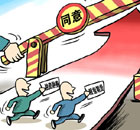Top Stories
Job seekers pounce on openings in Year of Tiger
By Wang Wen (China Daily)
Updated: 2010-02-22 09:10
 |
Large Medium Small |
March and April high time as companies lay out annual plan for new employees
As the lunar new year ignites a steady supply of pyrotechnics, so too are the feelings of the city's employees being fired up with the promise of new jobs after the economic crisis.
"It will be a new scene for a new year, and I want to find a new job with greater potential," said a female employee surnamed Hou, 25, who has worked in a PR company in Beijing for two years.
Hou said she has long wanted to quit her job but held back due to the troubled job market. She added that there are usually more opportunities after Spring Festival.
"March and April are the best months to find a new job. We named these two months as 'Golden March and Silver April'," said Ba Ran, senior employment consultant with Zhaopin.com, a renowned website for job hunting.
Ba said job opportunities are abundant during the period after Spring Festival because companies have usually completed their recruitment plans for the year and just released their job vacancies. She added there was more at play though than just the promise of new work.
"The year-end bonus is another important reason, of course," Ba said.
It can be good timing to change jobs after Spring Festival because many companies have just paid out their annual bonuses, Ba said.
She said a year-end bonus is a reward for the previous year of hard work, and no employee would give it up by quitting early.
Hu Chun has worked in an IT company for one year, but quit just before Spring Festival.
"I could not decide when to quit because I was unsure if I could get my annual bonus," she said.
Finally, she made her decision after talking with her supervisor, who promised to give her the bonus despite the timing.
Hu said she quit because she could not find opportunities for promotion within the company, considered the principal reason for job-hopping over recent years, according to a report from Zhaopin.com.
The report, released on March 19 last year, analyzed job-hopping after the 2009 Spring Festival. It stated that more than 30 percent of employees changed jobs because of a lack in opportunities for career development. The second main reason concerned salaries.
Ba with Zhaopin.com said these two reasons would continue into 2010 in Beijing.
She forecast companies in the education, training, automobile and environmental industries would probably witness a large number of job applicants over the next couple of years.
Business in these industries is on the rise and related companies will need more employees to handle the workload, Ba said.









